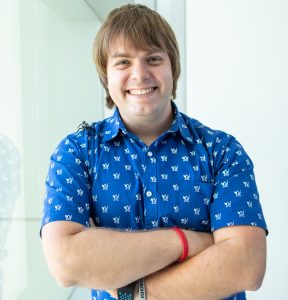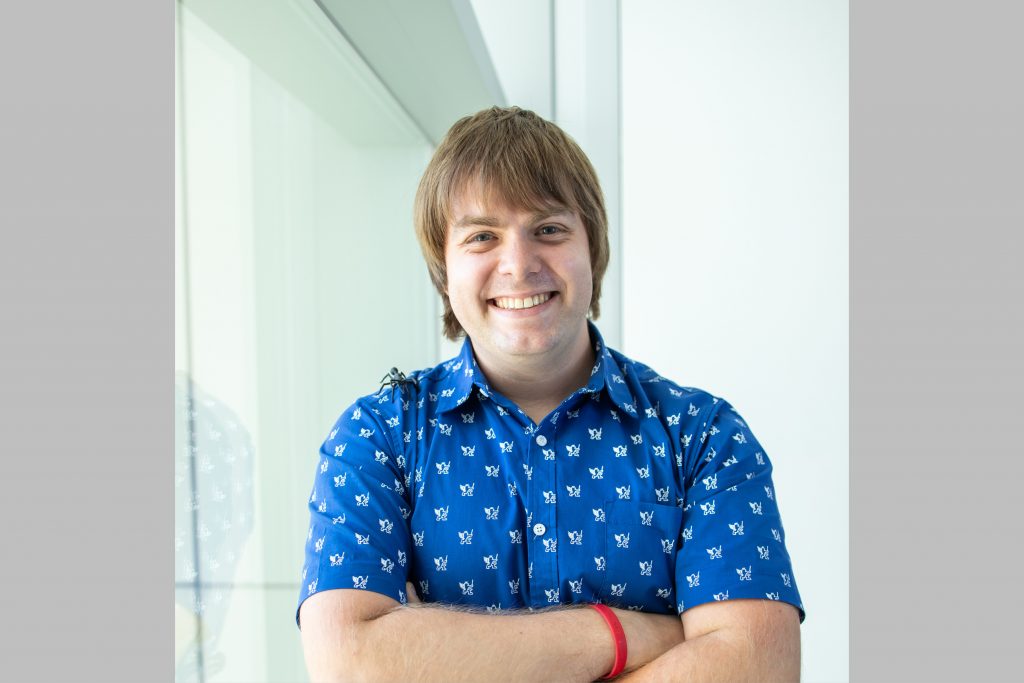We’re taking time to get to know the members of the GSA’s Early Career Scientist Committees. Join us to learn more about our 2020 early career scientist advocates.

Balint Z. Kacsoh
Policy Subcommittee
Epigenetics Department, University of Pennsylvania
Career Stage: Postdoc
Research Interest
I believe that the interplay of neurobiology and the social sciences, termed “sociogenetics,” is a critical region of study. In 1975, E.O. Wilson accurately predicted that a split in these two disciplines would occur primarily based on mechanistic/molecular approaches and evolutionary/ecological approaches. This disconnect is visible between approaches, where the social feature of an organism is not considered an inherent syndrome. Sociality, which is defined as the degree to which individuals tend to be gregarious or associate with others in social settings and form cooperative groups, ultimately increases the survival and fitness of the individuals. Sociality exists across many branches of the tree of life and is thought to encompass a spectrum of behaviors. We aim to better understand and define the relevant differences between a variety of social structures— from advanced colonies to more primitive social systems such as those seen in Drosophila— with more and more precise molecular and neurogenetic tools. E.O. Wilson suggested that the common denominator of sociality is the ability to communicate, stating: “…the terms society and social must be defined quite broadly in order to prevent arbitrary exclusion of many interesting phenomena” (Wilson 1971). In ants, bees, wasps, Drosophila, and other insects, we are fortunate to not only see how complex societies evolve independently of humans, but also to dissect the relationship between advanced social order, the forces of natural selection that shaped them, and the underlying neurogenetic, epigenetic, and genomic mechanisms that guide these behaviors. But what influences these behaviors on the molecular level, how do experiences shape our genetic information, and is there a single criterion that is truly suggestive of all forms of sociality?
Currently, I am the Rebecca Ridley Kry Fellow of the Damon Runyon Cancer Research Foundation in the lab of Dr. Shelley Berger at the University of Pennsylvania, in the Epigenetics Institute. My long-term goal is to answer the questions above using the more fluid reproductive plasticity present in ponerine ants such as Harpegnathos saltator, which I am using to study the epigenetic effects of caste identity as a function of social environments. I am also utilizing Camponotus floridanus as a model to study the effect of social interaction on epigenetics, lifespan, and physiology. Finally, I am studying Atta cephalotes as a model to dissect epigenetic regulation of caste determination and behavior in an advanced social system. We have only just arrived at the boundary between insect behavioral neurogenetics, evolution and ecology, and sociobiology, and the findings from my studies could have fruitful vertical integration to humans when asking about the genetics of sociality.
As a PhD-trained scientist, you have many career options. What career paths interest you the most?
My long-term goal is to become an academic researcher running my own research program. I hope to develop a program that focuses on the epigenetic factors underlying adaptive plasticity as a function of age, cellular state, and social setting in a disease context. Specifically, I wish to: 1) use multiple systems to establish a more phylogenetically-aware understanding of the epigenetic basis of animal plasticity by integrating the natural life history of each organism being studied; 2) use this knowledge to develop experimental techniques for the manipulation of the animal social setting and subsequent adaptive response in model and emerging/non- model systems; 3) utilize the insights gained to improve current understanding of the fundamentals of neurobiology, social setting, cellular state, and plasticity — behavioral and reproductive — in addition to developing novel strategies for their appropriate manipulation; and 4) apply these principles towards a better understanding of human disease as a function of social setting. Utilizing ants as a model system, I aim to address these fundamental yet understudied questions.
In addition to your research, how else do you want to advance the scientific enterprise?
My time as a junior researcher has been both productive and intellectually gratifying. In large part this is due to the outstanding guidance and support that I have received from senior members of the labs I have been a part of and the research community as a whole. I believe that mentorship is an indelible part of being an effective scientist, and I have had the privilege to participate in this process not just as a mentee, but also as a mentor to both high school and college students. Through the Dartmouth summer research program, a high school student joined the Bosco Lab and assisted me with fly and wasp husbandry, data acquisition, and basic molecular tasks. This experience was so mutually fruitful that she returned the following year to continue her work as a lab technician. Even more rewarding, she chose to minor in Biology due to the love of science she gained in the lab.
Imparting my knowledge of a particular skill to a new student is something I very much enjoy. I was lucky enough to mentor multiple Dartmouth undergraduate students from a variety of academic backgrounds, including science and business. Some of these students worked in other labs with different expertise, and I was recruited to help mentor and teach them certain behavioral and molecular assays. I also served as a teaching assistant for the introductory genetics class. Here I had the opportunity to share and engage with motivated students from a wide range of disciplines.
At the University of Pennsylvania, I am excited to be part of outreach programs hosted by the Epigenetics Institute. These programs are aimed at underrepresented and underserved communities ranging from middle to high school. I have also participated in broader science literacy outreach through programs like Skype A Scientist, a project aimed at reaching middle and elementary school students, as well as being part of public-facing scientific webinars sponsored by the Genetics Society of America.
In each of these instances I believe the experience was enriching for all parties. Together we explored scientific knowledge and employed critical thinking. Furthermore, I was able to view my own experiments and scientific thought through a different lens. I believe my role as a scientist includes the responsibility to engage with community members at all different stages and career paths, not just those pursuing a scientific profession. In these programs, I can help teach students in the lab about genetics and epigenetics using ants as a model system. Such outreach is essential for our field, and is a responsibility we have to the community.
As a leader within the Genetics Society of America, what do you hope to accomplish?
As a member of the Policy Subcommittee, I have the opportunity to advocate for and promote changes that would provide a better research environment for my fellow researchers across a variety of different job stages. This includes promoting science education to underrepresented communities who lack access to fundamental science courses and exposure to cutting edge topics, a mission I am very passionate about. I also hope to increase awareness for both local and national programs that focus on science education and outreach that would be beneficial for graduate students and postdocs. Collectively, I hope to advocate for policy changes that allow for academic institutions to highlight, promote, and partner with outreach programs. I am looking forward to working with a diverse number of scientists from across the globe and gaining insight into the challenges and opportunities in their communities.
Connect with Balint Kacsoh:
- Website: https://www.balintzkacsoh.com/
- Twitter: https://twitter.com/BalintZKacsoh
- Instagram: https://www.instagram.com/balint_z_kacsoh/































